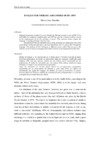Please use this identifier to cite or link to this item:
https://accedacris.ulpgc.es/jspui/handle/10553/77277
| DC Field | Value | Language |
|---|---|---|
| dc.contributor.author | De Juan González, Pilar | en_US |
| dc.date.accessioned | 2021-01-20T16:04:43Z | - |
| dc.date.available | 2021-01-20T16:04:43Z | - |
| dc.date.issued | 2002 | en_US |
| dc.identifier.isbn | 8460764230 | en_US |
| dc.identifier.uri | https://accedacris.ulpgc.es/handle/10553/77277 | - |
| dc.description.abstract | Although not always considered as such, English for Tourism is in fact a type of ESP. It not only fulfils the conditions established for any ESP, but also has a common culture shared by the professionals of all the activities it covers. This common culture shapes the language, awarding it specific characteristics. All students of Tourism should be aware of the pragmatic presuppositions shared by professionals in Tourism and, above all, they should know how to convey them through the language. The analysis of texts belonging to different sectors within Tourism proves the existence of such common presuppositions and reveals the main linguistic forms they take. | en_US |
| dc.description.abstract | Aunque no siempre se ha considerado así, el Inglés para el Turismo es un tipo de Inglés para Fines Específicos. De hecho, no sólo cumple todos los requisitos establecidos para cualquier IFE, sino que, además, dispone de una cultura común compartida por los profesionales de todas las actividades que éste incluye. Esta cultura moldea la lengua utilizada y le confiere unas características específicas. Todos los estudiantes de Turismo deben conocer las presuposiciones pragmáticas compartidas por los profesionales del Turismo y, sobre todo, deben ser capaces de transmitirlas por medio del lenguaje. El análisis de textos pertenecientes a sectores diversos dentro del Turismo confirma la existencia de tales presuposiciones y revela las principales formas lingüísticas que adopta. | en_US |
| dc.language | spa | en_US |
| dc.publisher | Universidad de Las Palmas de Gran Canaria (ULPGC) | en_US |
| dc.source | Actas del I Encuentro de Estudios de Filología Moderna y Traducción del 29 y 30 de noviembre y 1 de diciembre de 2001, pp. 715-723 | en_US |
| dc.subject | 550510 Filología | en_US |
| dc.subject | 57 Lingüística | en_US |
| dc.subject | 531290 Economía sectorial: turismo | en_US |
| dc.title | English for Tourism: a Discourse of its Own | en_US |
| dc.type | info:eu-repo/semantics/lecture | en_US |
| dc.type | Lecture | en_US |
| dc.relation.conference | I Encuentro de Estudios de Filología Moderna y Traducción | en_US |
| dc.investigacion | Artes y Humanidades | en_US |
| dc.type2 | Ponencia | en_US |
| dc.utils.revision | Sí | en_US |
| dc.identifier.ulpgc | Sí | en_US |
| dc.contributor.buulpgc | BU-HUM | en_US |
| item.grantfulltext | open | - |
| item.fulltext | Con texto completo | - |
| crisitem.author.dept | Departamento de Filología Moderna, Traducción e Interpretación | - |
| crisitem.author.fullName | De Juan González, Pilar | - |
| Appears in Collections: | Ponencias | |
Page view(s)
50
checked on Jan 11, 2026
Download(s)
191
checked on Jan 11, 2026
Google ScholarTM
Check
Altmetric
Share
Export metadata
Items in accedaCRIS are protected by copyright, with all rights reserved, unless otherwise indicated.
